January
The year began with cracks appearing in the government’s plan to dramatically reduce immigration by 2015 and reports of violence towards detainees by UKBA.
Evidence mounts against aim to slash immigration by 2015
Migrants’ Rights Network, 26 January 2011
This week, government ministers seemed to shy away from supporting its increasingly doomed objective of reducing immigration to the ‘tens of thousands’ by 2015. Meanwhile, a new Centre Forum report into the points based system could offer useful material towards an alternative approach.
—–
Deportee claims security staff held him down until he ‘could not breathe’
Guardian, Diane Taylor and Owen Bowcott, 23 January 2011
A Congolese asylum seeker claims he struggled to breathe when security staff restrained him at a Heathrow boarding gate, and feared he was “going to die”. Bienvenue Mbombo, 38, alleged that UK Border Agency escorts put a knee on his chest and sat on him as he resisted efforts to deport him on a Kenya Airways flight to Nairobi this month. The UKBA claimed Mbombo had become violent.
February
February saw more stories of lethal deportation conditions getting media coverage, alongside survey results showing that migrants are required as public sector workers if the jobs are to be filled.
Cap on skilled non-EU migrants ‘will leave holes in public sector’
Nigel Morris, the Independent, 25 February
Net migration has increased, mainly because the number of Britons moving abroad has fallen while immigration levels have stayed broadly constant over the last three years. Ministers said the continuing pressure on borders underlined the need to impose stricter limits on non-European Union citizens applying to live and work in this country. However, a survey found that many employers, including hospital managers, are struggling to fill vacancies because of tough new visa restrictions.
—–
G4S security firm was warned of lethal risk to refused asylum seekers
Guardian, Paul Lewis and Matthew Taylor, 8 February 2011
The multinational security company hired by the government to deport refused asylum seekers was warned repeatedly by its own staff that potentially lethal force was being used against deportees, an investigation by the Guardian has revealed.
March
Some important news stories on immigration detention in March …
Home Office ‘falsely imprisoned’ foreign nationals
Channel 4, 24 March 2011
The Home Office has been found to have operated an unlawful and secret policy of keeping nearly all foreign prisoners locked up beyond their sentence.
The judgement is part of a long running legal battle between the Home Office and human rights lawyers over the treatment of foreign national prisoners
—–
Immigration detainees ‘denied life-saving drugs’
The Independent, Emily Dugan, 20 March 2011
Hundreds of HIV-positive immigrants are routinely denied essential medication in British detention centres, resulting in lives being put at risk, doctors say. They are demanding improved healthcare facilities in immigration detention centres or the release of those suffering from the condition.
April
Refugee Council’s April poll highlighted a large proportion of the population are unsure of what a refugee is; also in April – new immigration rules resulting in some migrants not receiving legal protection in domestic violence cases.
Britons ‘confused over refugees’
Guardian, Press Association, 18 April 2011
A survey carried out to mark the 60th anniversary of the UN convention on refugees has revealed widespread confusion about what a refugee is. In 2009, 4,175 individuals were granted refugee status in the UK, but 44% of people who responded to the poll believed the figure was 100,000 or more. Many confused them with economic migrants.
More positively the survey by the Refugee Council found 82% of people agreed with the statement: “protecting the most vulnerable is a core British value”, and more than two thirds (67%) were sympathetic to refugees coming to this country.
—–
New immigration rules turn back the clock on domestic violence
Ruth Grove-White, MRN blog, 8 April
This week the government introduced a change to the immigration rules which will make it more difficult for some domestic violence victims to seek protection. So is the UK really more concerned with acting tough on immigration than with protecting victims of violence?
The changes mean that legal protection for migrant victims of domestic violence will no longer apply to applicants who have unspent criminal convictions. This change has been described by campaigners as potentially turning the clock back by ten years in the way that domestic violence victims are treated in the UK.
May
The opening of Morton Hall detention centre in Lincolnshire and the introduction of fees for immigration appeals were key headlines in May.
Morton Hall – Immigration Minister in grand opening of new migrant prison
NCADC, 27 May 2011
A former prison, newly designated as an Immigration Removal Centre, will be officially opened by Immigration Minister Damian Green on 1st June. Media representatives have been invited to the opening. Protesters for liberty and human rights are not invited to the event which starts at 10am, and should not consider trying to voice any dissent when the press meet the Minister at 11:30.
Previously an RAF base, Morton Hall has operated as a prison since 1985. Plans to change it’s purpose seemed dashed last summer, when it was announced that the government could not afford the high costs of locking up yet more refugees and migrants. Sadly however the Coalition has found the money, presumably from savings made by cutting public services.
Detention Action and other organisations have been campaigning against the expansion of detention. In a joint letter to the Immigration Minister last year, 25 organisations criticised the Morton Hall plans in the light of the UKBA’s “inefficient and damaging” use of existing detention centres and called for a moratorium on expansion.
—–
June
June saw the publishing of Lives in the Balance, a report by the Refugee council, alongside UKBA breaching the confidentiality of Sri Lankan refugees facing deportation.
Sri Lankans put at risk by UKBA breach of confidentiality
Free Movement, 10 June 2011
The immigration Barrister who blogs as Free Movement has revealed a serious breach of confidentiality of Sri Lankan refugees scheduled for deportation.
Ahead of a planned mass expulsion of Sri Lankans from Britain, the UK Border Agency is allowing Sri Lankan officials to interrogate detainees in the UK about their asylum claims, and is passing confidential asylum court documents.
The UK government has scheduled a charter flight for a mass expulsion to Sri Lanka on June 16. Some media are claiming that 250-300 mostly Tamil refugees are due to be deported. Free Movement warns that “the fact that there is a removal en masse arguably itself gives rise to significant concern as to the treatment of the returnees on return, given that the nature of removal will attract attention to them and identify the returnees as failed asylum seekers.”
But it gets worse. The woman in question, known as ‘XT’, was interviewed in detention in the UK by an official from the Sri Lankan High Commission. She was unrepresented when this interview occurred and her representatives had no notification of the interview. During this interview, ostensibly to verify her identity and nationality, it was revealed that the Home Office had passed confidential court documents from XT’s asylum appeal, with reference to her family’s connections with the LTTE Tamil Tigers.
There are growing concerns over the safety of the Sri Lankans rounded up for this mass expulsion. Questions need to be asked: Why does the UKBA allow Sri Lankan government officials to interrogate detainees in the UK? What documents are being passed to them? Can the UK government guarantee the safety of Sri Lankans being deported?
This comes amid ongoing concerns that the Sri Lankan government is trying to cover up war crimes and other atrocities committed during the war.
—–
Lives in the balance
Free Movement, 2 June 2011
The Refugee Council report Lives in the Balance: The quality of immigration legal advice given to separated children seeking asylum, is a short, sharp, very depressing but absolutely essential read for any solicitors, OISC advisers or barristers representing separated children in the asylum process.
July
In July the news that the Immigration Advisory Service had entered administration came as information emerged about the construction of a new “family only” detention center.
Legal aid cuts are leaving migrants lost in a maze
Steve Medley, Comment is Free in The Guardian, 13 July 2011
Earlier this week came the news that the largest specialist immigration advice charity – the Immigration Advisory Service – had entered administration. This comes just one year after the collapse of another specialist immigration and asylum charity, Refugee and Migrant Justice (RMJ).
The IAS has blamed this decision on cuts that are being made to the legal aid system, cuts designed to save £350m. Its closure could demonstrate the true extent of how some of the most vulnerable members of society will be affected by the loss of legal aid.
Around 10,000 clients are now without a representative to guide them through the maze of complex immigration rules, and the notoriously poor decision-making of the UK Border Agency. Many of these clients have suffered torture, mistreatment and trafficking. Services for these people are being taken away month by month. Recently, the highly respected Poppy Project, a specialist service for victims of trafficking, lost its contract.
Many times I have dealt with people who have been homeless, without support, simply because of an error within the UKBA, or on the basis of an incorrect decision by them. This isn’t a case of just disagreeing with the decision, it is when it is plain and simply wrong. Sometimes the only option is recourse through the courts, and lawyers are needed, as the UKBA persistently refuses to concede cases even when faced with overwhelming evidence.
If the IAS cannot be saved, then information about what will happen next must be made available to its former clients and this must also be available in the client’s language. Lack of information was what hurt clients most during the fallout from RMJ last year. One man killed himself when he was unable to get any information about his case, more than a month after RMJ closed. This must not be allowed to happen again.
—–
Britain is still no refuge for refugees
Natasha Walter, The Guardian, 27 July 2011
When the government announced last year that it would end the detention of children for immigration purposes, it felt as if a ray of sunshine had broken into a debate that had become increasingly dark and cruel. I work alongside women and children who have fled persecution to seek asylum in this country. Too many are disbelieved by decision makers, and refused leave to remain. They can then be forced into destitution, locked up, or dragged to an airport. Yet their experiences are shrouded in a darkness made up of both ignorance and hostility.
So what a relief it was to hear Nick Clegg announce an end to the “state-sponsored cruelty” of detaining children. Did this mean that we were going to have a more honest and transparent debate about what was happening to asylum seekers in the UK?
As the months have rolled on, it has become clear that this hope was misplaced. Detention never quite went away, and is now making a comeback. The proposed new centre at Pease Pottage in Sussex will provide a locked environment for up to nine families at a time. And as Nick Hardwick, the chief inspector of prisons, said this week, the refurbishment and expansion of the children’s unit at Tinsley House removal centre, at Gatwick airport, also “sits uneasily” with a commitment to end the detention of families. If a locked centre is called “pre-departure accommodation”, does it cease to be detention?
While the government brings detention for families back into the asylum process, other aspects of its policies are making it even harder for those seeking asylum to find justice. The reduction of legal aid and the recent collapse of two leading organisations providing legal advice – Refugee and Migrant Justice, and the Immigration Advisory Service – mean that more asylum seekers have to negotiate this crazily complicated system without legal support, making it much harder to get a fair hearing.
Like others in this field I find it painful to listen, week in, week out, to the stories that women tell me not only about the experiences that led them to flee their own country, but about the traumatic experiences they go through here. Recently I spoke to a woman who had been imprisoned and raped in a jail in Ethiopia as punishment for her political journalism. Yet when she came here for asylum she was detained three times in Yarl’s Wood detention centre, and lived destitute on the streets of London for months. “It wasn’t what happened to me in my home country that broke me,” she said, “It was what happened to me here. That was what broke my spirit.” To read more of this article see here
August
Investigations into multiple deaths in detention centres began in August.
Detention centre deaths spark police investigations
Diane Taylor and Matthew Taylor, The Guardian, 5 August 2011
Separate investigations into three deaths in immigration removal centres (IRC) in the past month have been launched by the police, amid growing concern about the treatment of detainees.
The spate of deaths has caused alarm among critics of the government’s detention policy, who warn that the system is at “breaking point” with poor healthcare putting people’s lives at risk.
Two men died from suspected heart attacks at Colnbrook near Heathrow airport and the third killed himself at the Campsfield House detention centre in Oxfordshire on Tuesday.
September
The concerning news that asylum seekers can only lodge claims to remain in the UK if their lawyers threaten legal action emerged in September.
Asylum seekers ‘prevented from lodging cases’
The Guardian, Owen Bowcott, 29 September 2011
Asylum seekers are being prevented from lodging claims for permission to stay in the UK unless their lawyers threaten legal action, according to the Law Society.
In a strongly worded criticism of shortcomings at the Asylum Screening Unit (ASU) in Croydon, south London, the body which represents solicitors complains of “degrading treatment”, telephones constantly engaged or rarely answered and individuals who arrive in person being sent away.
The letter, sent to the head of the ASU and the United Nations High Commissioner for Refugees (UNHCR), highlights concerns voiced by other groups about facilities in Croydon – the only place in the whole of the UK where asylum claims can be made.
October
Human rights was the topic of October with Theresa May’s famous “Cat Story”; her war against Article 8 of the European Convention of Human Rights; and disparities between the courts and UKBA’s interpretation of human rights.
Cats, lies, and family ties: human rights and wrongs at Tory Party conference
NCADC, 4 October 2011
An an ongoing crusade to remove the “universal” bit from the concept of human rights, the Conservative Home Secretary Theresa May has announced plans to deport more migrants who have completed prison sentences, even if it means breaking up families.
But first, a suspect cat incident. In her speech at the Tory Party conference today, Ms May illustrated the injustice of the Human Rights Act with the story of “the illegal immigrant who cannot be deported because – and I am not making this up – he had pet a cat.” Well, Theresa may not have made it up, but someone did. Even Ken Clarke knows it’s not true, challenging her to a bet that no one has been stopped from being deported from owning a cat.
—–
Foreign National Prisoners: an easy media target
NCADC, 31 October 2011
Last week saw the publication of John Vine’s report on how the UK Border Agency ‘manage’ foreign national prisoners. The UKBA’s Independent Chief Inspector commented on the improvement in UKBA’s monitoring of foreign national prisoners (following the 2006 ‘foreign prisoners fiasco‘), but has some clear criticisms of UKBA’s decision making, particularly in the “disparity” between the courts’ and UKBA’s “interpretation of human rights”.
November
Grabbing the headlines in November was the discovery that UKBA relaxed passport checks, a dispute followed about whose fault it was, and the resulting was resignation of Brody Clark – head of the UK Border Force.
UK border checks were relaxed at 28 ports and airports
BBC News, 15 November 2011
A pilot scheme to reduce passport checks on some citizens of EU countries was used at 28 ports and airports, Home Secretary Theresa May has revealed.
In response to written questions, Mrs May also disclosed that more than 10 million people entered the UK in August when the pilot scheme was operating.
Shadow home secretary Yvette Cooper said there was a “borders fiasco”.
Former UK Border Force chief Brodie Clark, who resigned last week, will be questioned by MPs this morning.
His appearance before the home affairs select committee will be followed by that of his then boss, UK Border Agency (UKBA) chief executive Rob Whiteman.
The 28 ports and airports at which the authorised pilot was used included Heathrow, Gatwick, Calais, Coquelles, Glasgow, Harwich, Manchester Airport, Aberdeen and Cardiff.
December
December has seen a considerable amount of resistance to charter flights deporting people to Sri Lanka, Afghanistan and Nigeria as well as information released from the UKBA regarding ‘preferred bidders’ who will be providing UK wide accommodation for asylum seekers.
New asylum housing contracts: Serco, G4S, Reliance
NCADC, 12 December 2011
The UK Border Agency has announced the ‘preferred bidders’ to provide accommodation for asylum seekers across the UK for the next 5 years.
Public and voluntary sector providers have been completely replaced by the three big multinational companies, all active in the detention and deportation business.
—–
Resistance to charter flights
Stop Deportations, 21 December 2011
Throughout December there has been a building resistance to charter flights with protests arising against flights deporting people to Sri Lanka, Afghanistan and Nigeria.
These protests have been taking place across the country and have captured the attention of the media in several cases.
No Borders North East organized a demonstration on the 19th of December 2011 at the UK Border Agency (UKBA) Northumbria Building, in North Shields, Tyne & Wear, UK.
They raised awareness towards a Charter flight, which was later due to depart that day. After demonstrating outside, activists then attempted to directly contact UKBA staff that had the authorization to determine the flights departure.
This follows a wave of autonomous action in the UK against charter flights. On Thursday 15th December, activists in West London had organised a protest against a UK charter flight to Sri Lanka and struck at the heart of the Government’s “unjust deportation machine”, when they blocked the road outside Colnbrook and Harmondsworth immigration prisons with ‘lock-on’ devices and a tripod. On Thursday 8th December, protestors ambushed the Nigerian High Commissioner in Central London over his support for a mass deportation to Nigeria schedul

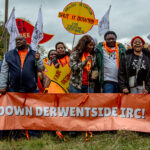

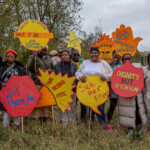
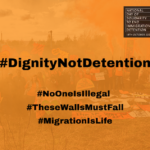

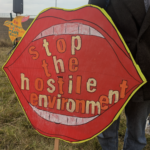




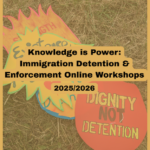
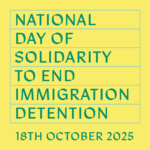
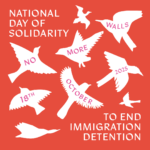
Discussion: